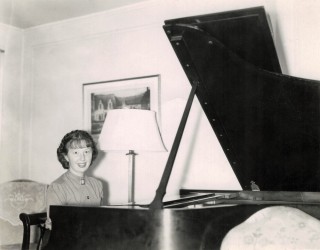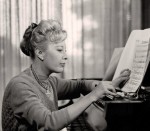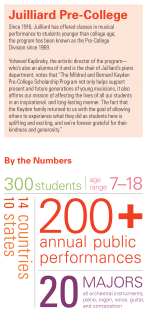Title

Mildred Kayden's lifetime in music was fostered by her time in Juilliard's Preparatory Center, the forerunner of Pre-College.
Music has always been an essential part of composer and lyricist Mildred Kayden's life. When she was 8, her mother, Anna Goldstein, bought a piano and hired a neighbor, a Juilliard student, to teach mother and daughter to play. It soon became clear that young Mildred had special talent and, the next year, in 1933, she came to Juilliard to study piano with Lonny Epstein (faculty 1927–64) at what was then called the Preparatory Center. Despite the long journey between her home in Brooklyn and the school—then on Claremont Avenue and West 122nd Street—the young pianist pursued her musical studies with eager dedication.
Body
After graduating as valedictorian of her class at Abraham Lincoln High School in Brooklyn, Kayden attended Vassar, where she studied with composer Ernst Krenek, who wound up publishing her piano sonata while she was still in college. Graduating in 1942, Kayden then studied music with Walter Piston at Harvard, receiving her master's in 1944. She subsequently taught music literature at Vassar. In 1950, she married real estate attorney and investor Bernard Kayden and had two children, Sanda and Jerold, who themselves attended Juilliard's Pre-College Division in the late 1950s and early 1960s, studying recorder, piano, trumpet, and trombone.
In 1956, Kayden became the host of a regular radio program on New York's WEVD called Musically Speaking, which aired until the early 1960s. One of the few female voices on the airwaves, she interviewed luminaries from the worlds of classical music, jazz, opera, theater, dance, and literature, among them Julian “Cannonball” Adderley, W. H. Auden, Leonard Bernstein, Aaron Copland, Geoffrey Holder, Alan Hovhaness, Lotte Lenya, Yehudi Menuhin ('26, music theory), Darius Milhaud, Hal Prince, Stephen Sondheim, Leopold Stokowski, and composer William Schuman (Juilliard president 1945–62). Recordings of the broadcasts are available in the archives of the Paley Center for Media in New York City.
Starting in the 1960s, Kayden's principal professional career has been as musical theater composer and lyricist. Her notable successes include Storyville (with playwright Ed Bullins), a musical about the New Orleans jazz district in the early 20th century, and Ionescopade (concept by Robert Allan Ackerman), based on the work of absurdist playwright Eugene Ionesco. Both have received numerous productions and have been revived in the last few years, Off Broadway at the York, to positive reviews. Her other productions include Call the Children Home (book by Tom Babe), Cut the Ribbons(lyrics by Mae Richards), Sepia Star (book by Ed Bullins), Vanity Fair (based on the Thackeray novel), and Oh! My Giddy Aunt (play by Ray Cooney). Kayden also composed two one-act operas, Mardi Gras (produced Off Broadway by City Opera's inaugural director, Laszlo Halasz, in 1963) and The Last Word (libretto by James Broughton).
Juilliard laid the foundation for what turned into her life's work. Kayden, who lives and continues her work in Boca Raton, Fla., said, “The early study of music before college is the surest way to make music part of one's professional or personal life forever. And that's what Julliard gave to me.” Because she and her children want to make sure that future generations of aspiring young musicians have the same ability to pursue their music studies regardless of means, the Kayden Foundation along with the Kayden family has created and permanently endowed the Mildred and Bernard Kayden Pre-College Scholarship Program.






